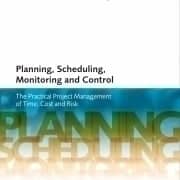
The APM has just launched a new book called “Planning, Scheduling, Monitoring and Control” which they claim might be “the best planning book ever published?” Can this be true?
This book claims to:
- Covers the basics and advanced approaches of project planning and control.
- Is easy to read with simple language and drawings.
- Covers practical techniques as well at theory.
So how does it meet these criteria?
Covers the basics and advanced scheduling approaches.
The book certainly explains the basics well and takes it beyond the principles in the other APM documents. For example it demonstrates the relationships between the product, work and cost breakdown structures in an effective way. Again it explains the management of dependencies and interfaces between work packages in a clear and simple way, highlighting good and bad practice in the development of the project network diagram. All this is presented in an easy to read format, with a good flow between the topics, unconstrained by some of the process models seen in other bodies of knowledge.
Advanced topics
The book also explains some advance topics extremely well. It was encouraging to see a good discussion of the management of interfaces between different projects i.e. when one project delivers something required to complete another. And some new areas look quite exciting including the use of buffers (from critical chain methods), the use of line of balance and time chainage (a new topic for me). It is admirable to see a chapter on agile planning. This section is quite brief but the integration of traditional methods with agile is a real area for future development and we would like to see more on this topic in future editions. It would also be nice to see example burn down charts and Fibonacci estimating techniques explained in future editions.
Is easy to read and use, with simple language and drawings
What really makes this book stand out is the simple language, consistent terminology and drawings. Throughout the text keywords are defined clearly and consistently and the text does not introduce new terms without explaining them. You don’t feel like you have to fire up google to look up terms you don’t understand. Although one exception is the explanation of a Tornado Chart which could do with a few more words.
The drawings are very good, in full colour and well labeled and annotated. The take you through the project control process step by step.
Covers practical techniques.
The book aims to be a practical guide; and it certainly fulfills this brief. It covers some to the key topics that are important in maintaining a project schedule such as when to rebaseline a plan vs replanning from scratch. How to measure percentage complete when using earned value management and how to monitor and measure progress on a work package. These are practical nitty gritty topics that are important for practical application of effective project control.
So it seems that this book meets its brief but could anything be improved? Well yes; the chapters on estimating and cost control are a bit brief. It would be good to see a bit more on the use of a standard cost breakdown structure to collect and improve estimates across an organisation. A discussion on integrating cost reporting and schedule reporting using control accounts would have been good. In particular how to join the schedule and the cost plan. Getting the planner and the cost engineer to talk has always been a problem and maybe this will follow in the next edition of the book.
So is this the best project planning book in the world? Probably.